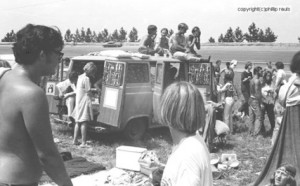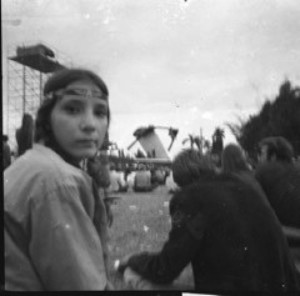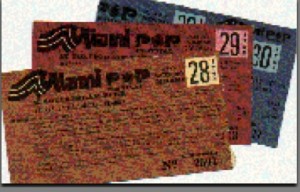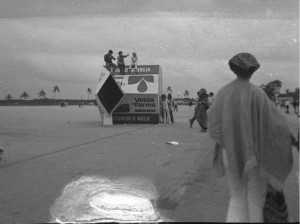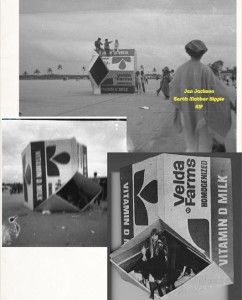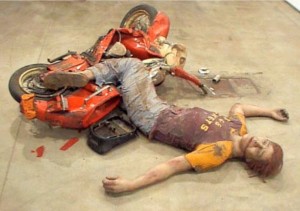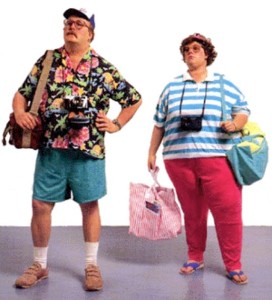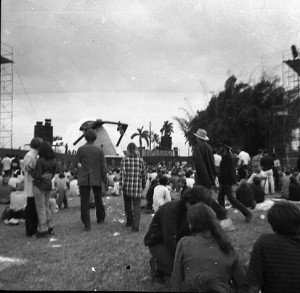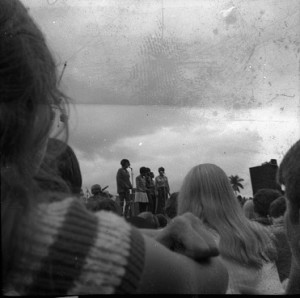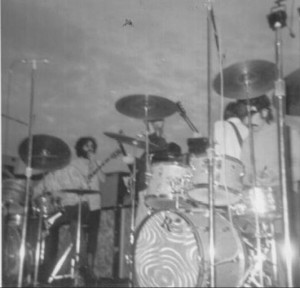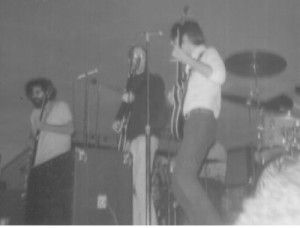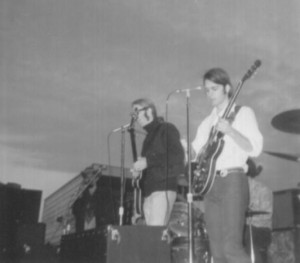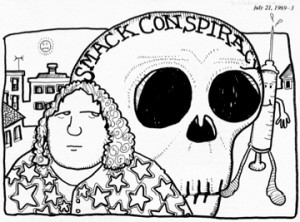From The Great Speckled Bird July 7, 1970 pg. 2-3
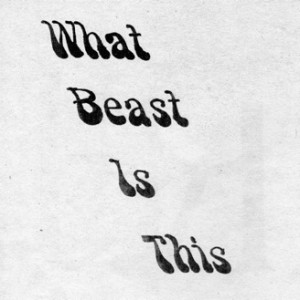
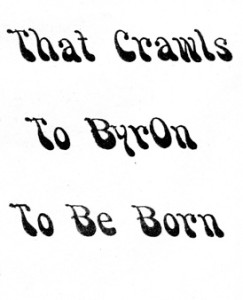
Let us celebrate the triumph of Byron. WE DID A THING! To understand its nature and its impact, we must see the Atlanta Pop Festival not as a “music extravaganza,” nor simply as an occasion to do all
the dope we wanted to in total freedom, a chance to get naked, and a moment of meditation but – and this is absolutely basic -as a people’s assembly in, of, and for Woodstock Nation, population in the millions, of whom several hundred thousand were gathered at Byron, Georgia. It is the year 2, the second year in the life of our new nation—Woodstock Nation—born on the streets of Chicago in August of 68, baptized in White Lake, New York. the following summer, evicted from People’s Park, educated at Columbia, graduated at Kent State, stronger every day with much more than a chronological growth: a new nation, conceived in the bowels of the Monster and dedicated to the liberation of all the Kirns from all the Spiros. Learning more about How in Byron.
If the idea of us as a “nation” seems, at first, far-fetched, it’s because nations are traditionally defined in terms of contiguous territory with continuous borders. Ours is not—yet. We hold title to no territory, we control no geographic space in Amerika; we live and evolve in significant but very small and widely scattered aggregations of spaces—10th Street Atlanta, Lower East Side. Bay Area, the Commons in Boston. And we are more than this, we have residents our consciousness who can be found in every city, town, hamlet, and countryside from coast to coast. No matter how strong our numbers, pigs riddle even our most secure areas. And every time a billy club comes down on a head in California, all the longhairs across the country, down into the Deep South of Byron, Georgia- we all feel the blow.
So our nation is measured not in square miles but in People. And more than that by mere numbers of people (another dehumanizing form of body count), we are measured by our consciousness, by our commitment, by our dedication to the establishment of new life in the rotten gut of Babylon/monster/Amerika. It is in that way, with that understanding, that it makes sense to speak of Byron as a triumph.
Because Byron was about growth. ‘No one who was there,” blares the billboard for Woodstock (the movie) “will ever be the same again.” More than you know Warner Brothers, more than you know. We came to Byron hopeful but uptight. We left joyful and confident, because not only had we done a Thing, but the way we learned to do it was by the very process of doing it.
As at Woodstock, we were many hundred thousands strong. Some say 5, some say 4 or 3, some say 2 1/2 hundred thousands. In any case, these thousands were confined to 162 acres. If you can imagine cramming the population of Atlanta into a quarter of a square mile, you get some picture of the squeeze. Allowing 75 square feel for each of the 30,000 cars in that area, there remained for all the people present a legal allotment of 11,749 square feel a space measuring roughly 3 1/2 feet square per person. Should we be surprised that “private property” was tresspassed,” or that a “private” club (so labelled to “keep out the ni–ers”) refused even to negotiate for the use of their land and lake?
The Silent Majority of Amerika cannot comprehend either this magnitude (quantity) or of the consciousness (quality) of the people at the festival: nor could they be expected to understand. Our own failures within the New come straight out of the system of values and institutions that grasps these millions in its iron jaws. And so we are just beginning our struggle to break free. We make mistakes. The many failures within this gathering together of Woodstock Nation flow directly from the system which renders the straight world incapable of digging the truth of the event. Our own incompetencies stem from capitalist conditioning from the day we were born in Amerika where you hustle for the dollar and take care of ol’ number one first and foremost. The system has challenged us to take ourselves seriously as Woodstock Nation. Amerika comes on strong; it is powerful- the most powerful empire in the history of our planet -and it takes a shit-load of revolutionary discipline (not Amerikan “discipline”) to maintain and nourish our consciousness of a citizenship distinct from Amerika. We are conditioned to remain ignorant. Conditioned to be specialists in a capitalist industrial system where everyone has his “place.” Trained to call in an “expert” when something goes wrong, channelled into brain factories instead of (also) being taught that our hands and heads will work creatively it we use them, educated into the inability to repair our automobiles, build fires, or find our way out of the woods.
Pampered in and by an obscenely affluent society, we overlook the real fact that the economic resources of Woodstock Nation are pitifully small: Woodstock/Atlanta is an economy of scarcity, not of affluence, and in that respect we resemble people’s China more than we might at first glance. At the festival, this showed in our wasting of precious water, our squandering of money that could and should have gone to the festival (not the promoters, but “us)
Music drew us, constant music, a three-day bath in the sounds that have given us back our bodies, freed them from the tyranny of our “do-don’t” Minds. We came as passive consumers, whose only responsibility for the success of the festival was to pay $14, just like –dig it- Disneyland. Only it didn’t work out that way. 80-90% of the people gathered did not have tickets and had no intention of buying them at the gate. Either because they could not afford them or because they figured sooner or later they could force the promoters to proclaim a “free” festival.
Thursday night and all day Friday that’swhere it was at: us (the people) against them (the promoters, who threatened to cancel the festival if enough tickets were not sold to cover their “losses”—that was Thursday night). Action creates reaction, and the rumor (later reported as fact by the Atlanta Constitution) that bikers had been hired to tote shotguns to keep people without tickets out triggered militant “plans” (which were as strategically moronic as they were ideologically heroic) to tear down the fences and liberate the music.
Both sides were off the mark. The people were naive, the promoters functioning out of ignorance, greed, and/or fear. Had the Cosmic Conspiracy not intervened, I don’t know what would have happened, I don’t know how the battle of the gate would have turned out. But massively and dramatically at three crucial moments, the cosmos took on a vanguard role. First the heat. It was so goddam hot that it was difficult to get beyond one’s personal survival, let alone get juiced up about storming the gate or guarding it. Because it was hot, and because of our imprisonment in a consciousness of affluence and greed, we were unaware that we were selfishly wasting a precious resource—water. Water. Water poured over people from 5 gallon cans “just to cool off.” Water running from barrels onto the ground as people washed their hands and faces under the spigot. Water turning to mud as folks drank directly from the hose, diverting that water from those barrels. Water flowing 9 o’clock Friday night at a measured rate of a gallon and a half per minute -the sole source for 15,000 in our campground.
But by then it had rained, so that the people who had crowded like cattle to the showers now fled to thier tents to escape the biggest, most democratically distributed, treeest shower available most but not all. Some had learned. So that the surge to the gate—reversed. So that the land (not to speak of the people) cooled. So that the lines at the water barrels disappeared; the precious resource could be conserved, could gain on the thirst of a refreshed people. And the music—stopped. Into which stepped the promoters. Using the rain as what could only be called a transparently lame excuse, Friday night’s music (only) was declared “free.” Having thus lured us back witli B. B. King, however, the promoters laid on their larger audience basically the same riff as the night before: we need bread. Basically the same— they wanted everybody to pay—but still different: $1 a day, they said, would see them through.
It never happened. Saturday we finally made it inside the fence. There was time to take showers, now about half inoperative, but hot naked freaks were standing quietly in line, holding each other’s clothes—again we were learning. There was a hole in the inside fence, which previously herded people to the rear of the concert site. Standing there was a dude with a money pail; outside had been a people’s propagandist with a bullhorn. Period. Economic coercion and accompanying threat of violence had vanished. Even the bikers seemed relieved;
Inside the people were very together, especially . considering the fact that by now the outside world knew the “concert” was “free” and there would be a lot of straight people coming in to dig our music. The rain came again, this time to loosen the crowd up, to drive the straights for shelter. We stuck it out until the rain had served its purpose. Night had fallen but the fireworks people launched a red sun, that hung in the sky, growing brighter for maybe 30 seconds before it set. WE DID A THING!
And we learned that music is just as important to us, no more, no less, as our own blood, for music is the blood of Woodstock Nation-it flows through all of us— as crucial to our survival as dope, which gets us high, inspires us, strengthens us, communizes us; and as water.
We came to Byron believing that music should be free, that it should be the occasion for no one making a profit, hoarding thus the scant resources ofWoodstock Nation. But we learned that while nothing is without its price, selling us our music was precisely and exactly the same as selling us our water would have been.
The promoters evidenced that kind of growth on Saturday when the stage announced that all dope dealers were being asked to give 10% of their bread—and concessions 25%. Now DIG. That procedure is national, wethepeopleofwoodstocknation levy the following taxes. Enforcement? That, of course, did not happen— this time—but it could have, and next time it might. Suppose, for instance, four hours after these announcements, the ir had resounded:
Okay now, we’ve had four righteous dealers pay their dues, so here’s what we ‘re gonna do. If those four guys, and we remember who you are, will come up here now, we ‘II give you a stamped receipt. Any other dealer who comes across will also get a receipt. And people, ask your dealer to show you his receipt when you buy your next hit.
A s for the concessions, well, they don’t seem to have gotten the message, so let’s try this. We know you’re thirsty, so we’re not going to ask you not to buy drinks. We are, however, going to suggest that you Don’t Buy Coke-until Coke comes across. If and when Coke pays up, we’ll ask you then to patronize only them, until Pepsi gets religion. You dig?
And we would dig, even though that did not happen this time-this time
So now we know where we are. One nation conceived in concert and dedicated to the proposition that we are One. Our music is not for sale; no amount of money can “buy it.” For we are our music, as much as it is us. And our music, it turns out, is not free; it costs us our lives.
As the Jefferson Airplane sings, “Our life’s too fine to let it die.” Nor will it die. But we must understand that in order for our life to live, we must destroy Ameri-ka. Our room to live, to build our own cities, towns, festivals, industries, must be chipped piece by piece or seized all at once from those pigs who now call their lakes and clubs “private property.” Our life, our stoned, rhythmic energy will endure (and grow) only through constant, ceaseless struggle—total war against Amerika. All your private property is target for your enemy / And your enemy is- We. WE.
Moreover, our life’s too fine to hoard it the way the pigs hoard their wealth, so we shall grow, we are growing. As we drove up freak-lined 1-75, the spirit of the festival drifted up the road like lingering marijuana smoke; At first, I noticed, we freeks banded together in the right-hand lane, slowing down traffic so that the sisters and brothers could safely catch and give rides, while the straights took the left lane, eyeing us curiously. But the further up the road we went (the longer the straights had to get used to us), the friendlier they became; one lady waved first; another dude passed six hitchhikers-and picked up the seventh.
And the kids of the straights? We lured them from our psychedelic cars with Vs answering their own that they subersively flashed from the back seat of the family car on a Sunday drive.
At our exit, I held my hat out the window, waving to a carload of freeks movin on up the road. Sad that for us the festival had ended; but joyous in the bonds that link my family with literally hundreds of thousands of other families from coast to coast—we sleep “free” in Vermont, California, Oregon, Georgia, every state in the Union, under the freek flag of Woodstock Nation. STP.
-greg gregory


